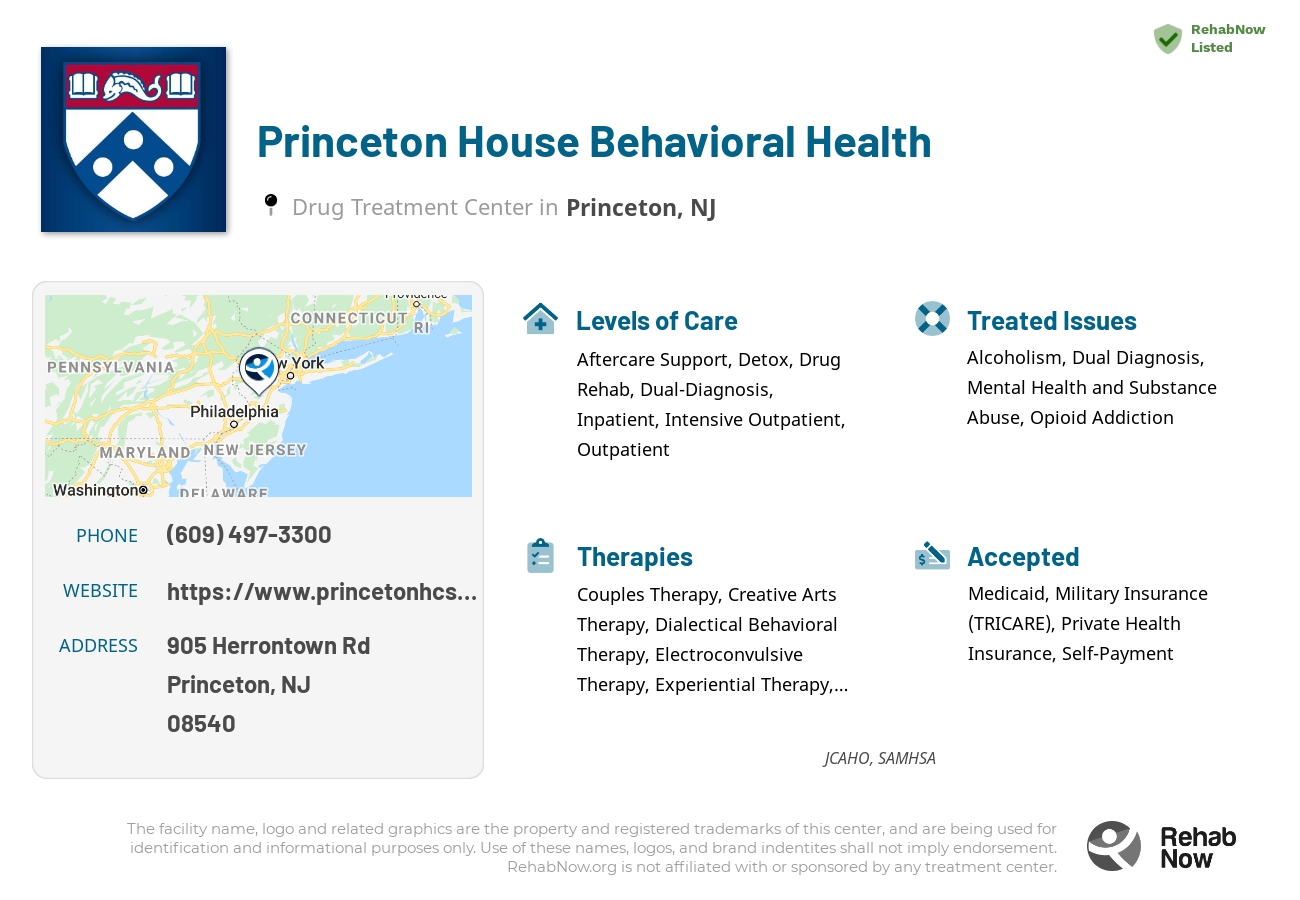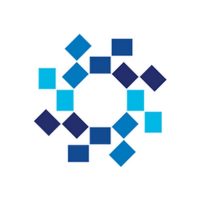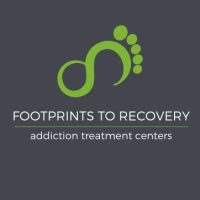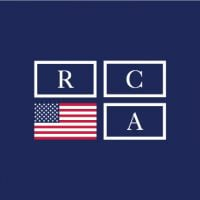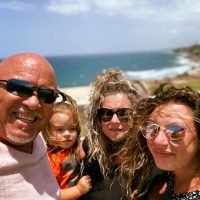Princeton House Behavioral Health
Drug Rehab Center in Princeton, New Jersey
Princeton House Behavioral Health is an accredited Addiction Treatment Facility in Princeton, NJ which offers comprehensive drug rehab services with residential and outpatient programs tailored to the individual's needs and goals, aimed at helping each client develop life skills and strategies for maintaining long-term sobriety.
About This Princeton, NJ Facility
Princeton House Behavioral Health, located in Princeton, NJ, has been at the forefront of addiction treatment for over 50 years. This nonprofit institution stands out for its state-of-the-art technologies and highly trained medical staff. They offer a compassionate, comprehensive approach to individuals struggling with drug or alcohol addiction, ensuring a tailored experience to meet the unique needs of each patient.
- State-of-the-art Technologies: Utilizing advanced medical technologies to enhance treatment efficacy.
- Highly Trained Medical Staff: A team of professionals providing continuous, specialized care.
- Comprehensive Program Offerings: From medical detoxification to residential inpatient programs and outpatient services, they cover a full spectrum of care levels.
Accredited by both the Joint Commission on Accreditation of Healthcare Organizations (JCAHO) and the Substance Abuse and Mental Health Services Administration (SAMHSA), Princeton House Behavioral Health represents a beacon of excellence in addiction treatment. Their wide range of services, including intensive inpatient and outpatient programs, is designed to provide effective, personalized care to those in need.
Treating a variety of addictions, including alcohol and benzodiazepines, the center employs methods ranging from medical detoxification to expressive therapies and evidence-based treatments. Offering different levels of care, they ensure that each individual’s path to recovery is as unique as their situation.
Genders
Ages
Modality
Additional
Accreditations
SAMHSA

JCAHO
Conditions and Issues Treated
Substance abuse refers to the intensive and inappropriate use of psychoactive substances. Psychoactive substances are those that affect brain function. These include illegal drugs, alcohol, and even the excessive use of prescription drugs. The overuse of psychoactive substances leads to severe physical or psychological dependence. It also affects the social life and relationships of the affected individual. Substance abuse is treatable.
The duration of treatment at Princeton House Behavioral Health in Princeton can require weeks or even months depending on the severity of the condition as there is a risk of relapse. Treatment options include medications, counseling sessions, various types of behavioral therapy, and group therapy in different combinations.
Addiction to prescription opioid painkillers like oxycodone and hydrocodone, and illicit opioids such as heroin, leads to potentially life-threatening withdrawal symptoms when discontinued. Opioid addiction treatment typically involves an inpatient stay at facilities like Princeton House Behavioral Health to make sure they get through withdrawal safely. Treatment also includes comprehensive mental health counseling.
Mental illness includes conditions such as anxiety, depression, schizophrenia, bipolar disorder. It can also happen that mental illness causes drug addiction and vice versa. Princeton House Behavioral Health in New Jersey knows it is vital to diagnose dual diagnosis or co-occurring disorder.
Levels of Care Offered
This center offers a variety of custom treatment tailored to individual recovery. Currently available are Aftercare Support, Detox, Drug Rehab, Dual-Diagnosis, Inpatient, Intensive Outpatient, Outpatient, with additional therapies available as listed below.
One of the first things an addict should do when entering treatment is to abstain from using illicit drugs completely. Depending on the length of time that the person has been using, the addict may have to go through alcohol or drug withdrawal. Fortunately, detox doesn’t have to be done alone, and withdrawal symptoms can be managed medically in an inpatient or outpatient setting. While detox may be uncomfortable, it is not life-threatening. Detoxification allows the addict to rid the body of all traces of drugs or alcohol and gives the addict a clean slate for their recovery.
Inpatient programs are intensive regimes that require individuals suffering from serious addictions to admit themselves into a controlled environment. Inpatient programs in New Jersey generally span over 28 days to six months. The first step in an inpatient program is medically assisted detox. Doctors and addiction specialists at Princeton House Behavioral Health monitor the individual’s vital signs as the drugs leave their system. Some inpatient rehab programs also provide counseling for family members to provide encouragement and emotional support. In inpatient programs, patients have access to 24-hour medical supervision.
Daily trips to the hospital that provides the treatment include intensive outpatient services (IOP). IOP in New Jersey is appropriate for patients in residential recovery facilities that have been diagnosed with addiction. Patients return to their everyday lives gradually, increasing the likeliness of success in treatment.
To assist with alcohol or opioid abuse, or a co-occurring condition, Princeton House Behavioral Health offers an outpatient treatment program. For their rehabilitation and other services, the New Jersey patient will go to the treatment center, yet return home every night. After most of the program is completed, the level of mandatory participation reduces.
Treatment is just a first step in sustaining sobriety. After rehabilitation, counseling for aftercare helps the person adapt to a life without drugs. A sober living facility in Princeton, job therapy, or educational assistance may be included in this service, managed by Princeton House Behavioral Health. This is when a preventive strategy for relapse starts to take shape.
Princeton House Behavioral Health‘s Therapies & Programs
In addiction recovery at Princeton House Behavioral Health, therapy plays a significant role. This helps patients get to the root of their addiction and discover how the problems that contributed to their use can be handled better. Therapy can be performed in a group and one on one settings. The patient interacts with the therapist in a one-on-one atmosphere during individual therapy. This encourages them to reflect on the underlying addiction problems and develop ways to avoid potential future abuse.
Recovering from addiction involves recovering relationships as well. One of the most common areas of stress and damage during addiction is in intimate relationships. Couples therapy at Princeton House Behavioral Health can rebuild trust and joy that may have been damaged. Addiction involves everyone in the family, not only the addict.
Family roles can change in damaging ways that may require professional help to rebalance. Successful intimate relationships can decrease the chances for relapse by ensuring a healthy environment after rehab in Princeton, NJ.
Addiction and alcoholism affect the entire family. For this reason, family therapy is vital to a person’s recovery from addiction. In contrast to couples counseling, family therapy at Princeton House Behavioral Health may include siblings, children, parents, and other significant people in the recovering person’s life. Family support is one of the most important pillars of recovery.
Many people turn to drugs and alcohol as a way of processing trauma that has affected them in the past. Trauma can include abuse, neglect, the loss of a loved one and other unpleasant incidents. Trauma therapy at Princeton House Behavioral Health helps patients process trauma. It gives them the tools to deal with it in a healthier manner.
Dialectical behavioral therapy (DBT) is a type of Cognitive Behavioral Therapy that focuses on eliminating specific negative thoughts such as suicidal thoughts that can potentially lead to an individual inflicting self-harm. It is useful in the treatment of patients exhibiting uncontrollable emotions, intense mood swings, and borderline personality disorders.
The term “Dialectic” means the integration of opposites. In the substance abuse context, DBT refers to accepting the patient’s addiction and working to change their thoughts and behavior. It improves life skills such as controlling the intense emotions without reacting impulsively, resolving the interpersonal conflicts effectively, and promoting awareness about self and others.
Cognitive Behavioral Therapy (CBT) examines the relationship between a patient’s thoughts, feelings and behaviors. Princeton House Behavioral Health aims to establish a healthy response to thoughts and feelings as an alternative to turning to drugs and alcohol. It also promotes healthy communication between addicts and those around them. It is and effective therapy for people suffering with all types of addictions.
EMDR therapy is combined with behavioral therapies to address the root cause of the problem. The rapid eye movements reduce the patients’ negative feelings related to the trauma and promote calmness and relaxation.
Life skills pertain to the skill sets a person should possess to become successful in life. Examples are time management, budgeting, and social abilities. Life skills therapy highlights the fact that addiction recovery is more than just a person’s ability to go through their day-to-day without resorting to substance use in Princeton, NJ once they leave the facility.
The recovery technique used by Alcoholics Anonymous is the 12 step program, but it can relate to any form of addiction. The 12 steps that addicts must take on the road to recovery are explained. Measures include acknowledging that you have a problem and agreeing to turn around your life. The curriculum, instructed by Princeton House Behavioral Health, also requires a belief in a greater power and making amends to others.
It’s no surprise that diet is a crucial player in one’s well-being. What an individual puts into his or her body becomes the fuel that drives the mental and physical faculties to perform accordingly. Therefore, nutrition therapy, also known as medical nutrition therapy (MNT), guarantees that an individual is providing his or her mind and body with proper nourishment.
The right diet can improve a person’s general outlook, sleep habits, and thought processing skills. MNT also lowers the occurrence of chronic diseases such as adult-onset diabetes. Dieticians at Princeton House Behavioral Health in Princeton, New Jersey believe that nutrition therapy is the key to making significant lifestyle changes, especially when it comes to personal care.Nicotine Replacement Therapy (NRTC) used products like skin patches and gum to deliver nicotine into the bloodstream of people trying to quit smoking. This helps break the habits associated with smoking. The very low doses of nicotine managed by Princeton House Behavioral Health prevent cravings while helping people make a gradual transition to complete smoking cessation.
Contingency Management (CM), also called motivational incentives, is a type of pure behavioral therapy. It’s based on the idea that behavior is shaped, motivated, or controlled by its outcomes. CM is a clinical application at Princeton House Behavioral Health of operant conditioning, which helps clients eliminate unwanted behaviors by the use of positive and negative reinforcement.
Patient Experience
Creative Arts
For those combating addiction recovery in Princeton, NJ, creative arts therapy, or expressive therapy, is advantageous. Reading, music, theater, art, and other types of self-expression may be included. Princeton House Behavioral Health uses this to enhance the mental state of the patient and help them to focus on something other than addiction. It helps patients to explore how, through the creative process, their thoughts and emotions play out.
Experiential Therapy at Princeton House Behavioral Health
Experential therapy is a unique type of therapy that deals with the subconscious mind. This treatment available at Princeton House Behavioral Health in Princeton, NJ encourages individuals to work out their issues with their inner self through synchronous experiences.
This non-traditional treatment method makes use of the physique and encourages people to take part in various physical and emotional activities, movements, and practices. Some of the most common examples of experiential therapy are equine therapy, music therapy, adventure therapy, and role playing. Through these various methods, an individual is believed to heal from trauma, negative emotions, and hurtful memories faster. Moreover, experiential therapy is known to have enduring results which can be beneficial to sufferers.
Payment Options Accepted
For specific insurance or payment methods please contact us.
Is your insurance accepted?
Ask an expert, call (888) 674-0062
Princeton HealthCare System Associated Centers
Discover treatment facilities under the same provider.
- Princeton HealthCare System - Eatontown in Eatontown, NJ
- Princeton HealthCare System - Moorestown in Moorestown, NJ
- Princeton HealthCare System - Princeton in Princeton, NJ
- Princeton HealthCare System - Lucas Road in Princeton, NJ
- Princeton HealthCare System - North Brunswick in North Brunswick, NJ
Learn More About Princeton HealthCare System Centers
Additional Details
Specifics, location, and helpful extra information.
Princeton, New Jersey 08540 Phone Number(609) 497-3300 Meta DetailsUpdated April 15, 2024
Staff Verified
Patient Reviews
There are no reviews yet. Be the first one to write one.
Princeton, New Jersey Addiction Information
The state of New Jersey is afflicted by the rising opioid overdose crisis and the increase in the number of residents engaging in illegal substance abuse. 90% of the 2,900 drug overdose deaths in New Jersey involved opioids in 2018. Over 1.1 million New Jersey residents reportedly use drugs in a given year. High prevalence of drug and alcohol abuse caused 14% of all deaths in the state between 2008 and 2017.
According to statistics, about 5,000 people in Princeton struggle with addiction to drugs or alcohol. This accounts for about 7% of the population. Alcohol is still the most commonly abused substance in Princeton. There were 1,526 admissions to Princeton drug and alcohol treatment facilities in 2014. There are several drug and alcohol treatment facilities in Princeton, NJ. The best treatment for you will depend on your individual needs and preferences.
Treatment in Nearby Cities
- Cape May Court House, NJ (90.8 mi.)
- Northfield, NJ (70.6 mi.)
- Dover, NJ (34.6 mi.)
- Ledgewood, NJ (34.2 mi.)
- Millville, NJ (71.2 mi.)
Centers near Princeton House Behavioral Health
The facility name, logo and brand are the property and registered trademarks of Princeton House Behavioral Health, and are being used for identification and informational purposes only. Use of these names, logos and brands shall not imply endorsement. RehabNow.org is not affiliated with or sponsored by Princeton House Behavioral Health.




